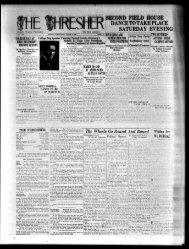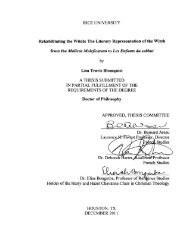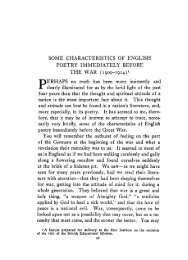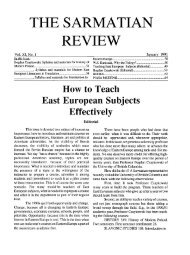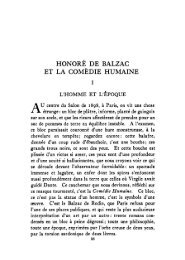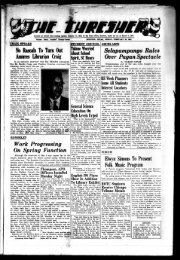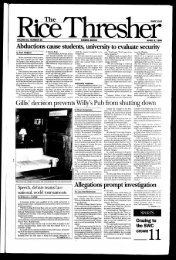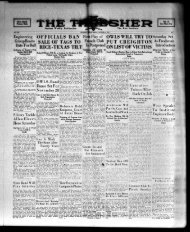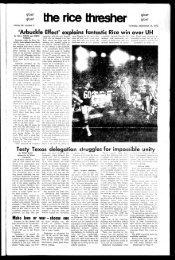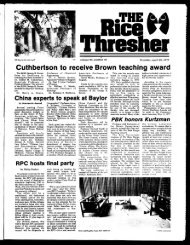A" -rf Hackerman shrugs off low ratings of grad programs - Rice ...
A" -rf Hackerman shrugs off low ratings of grad programs - Rice ...
A" -rf Hackerman shrugs off low ratings of grad programs - Rice ...
Create successful ePaper yourself
Turn your PDF publications into a flip-book with our unique Google optimized e-Paper software.
Thresher/Fine Arts<br />
Shange finds teaching refreshing and enlightening<br />
Ntozake Shange is best known<br />
for her Obie-winning For colored<br />
girls who have considered suicide<br />
when the rainbow is enuf, but she<br />
has also written volumes <strong>of</strong> poetry<br />
and has just completed a novel.<br />
However, these varied literary<br />
accomplishments are not the only<br />
things that she considers<br />
important, and these other aspects<br />
<strong>of</strong> her character are what have<br />
brought her to <strong>Rice</strong>.<br />
Shange is teaching two courses<br />
at <strong>Rice</strong> this semester, an English<br />
course on Afro-American<br />
literature and a history<br />
department course on the<br />
Reconstruction and its effects<br />
throughout the entire country, not<br />
just the South. The English course<br />
is nominally a survey <strong>of</strong> Afro-<br />
American wried them with her<br />
personal favorites. Shange hopes<br />
that this combination <strong>of</strong> the most<br />
famous with the well-written but<br />
not-so-well-known will give her<br />
students a more representative<br />
view <strong>of</strong> black literature in this<br />
country.<br />
Just as her survey lit course is<br />
more than a survey, so to her<br />
history course is not simply a<br />
historical recounting <strong>of</strong> what and<br />
Cinema<br />
who came when, but is an attempt<br />
to discover the reasons why certain<br />
people have became hallmarks <strong>of</strong><br />
black thought. "It's not a question<br />
that I know the answer to," Shange<br />
admits, Til be looking for the<br />
a nswer j ust as m uch as my students<br />
will. This course is a seminar in the<br />
true sense <strong>of</strong> the word, an attempt<br />
to find answers through the<br />
academic processes <strong>of</strong> discussion<br />
and interchange <strong>of</strong> ideas. We may<br />
even find by the end <strong>of</strong> the course<br />
that the answer is very simple."<br />
This aspect <strong>of</strong> Shange's course<br />
is, in a broader sense, the reason<br />
that she came to <strong>Rice</strong>. Having been<br />
trained to teach in college, she<br />
found that she missed it when she<br />
immersed herself in theatrical<br />
work for seven years. "I wanted to<br />
teach, 1 always have. Theatre after<br />
seven years had become arid to me.<br />
I was losing touch with my<br />
motivations as an artist. The<br />
subject <strong>of</strong> my writing is contact<br />
with people. I get that from<br />
teaching."<br />
Although Shange's Mellon<br />
appointment at <strong>Rice</strong> is presently<br />
only for one semester, she would<br />
like to continue teaching here. If<br />
she is not <strong><strong>of</strong>f</strong>ered a more<br />
permanent position here, she will<br />
still remain in the Houston area,<br />
which she now considers her home.<br />
Shange feels that her move from<br />
New York was painless, both<br />
because she needed a break from<br />
its frenetic theatre world and<br />
because Houston <strong><strong>of</strong>f</strong>ered her the<br />
chance to teach and to be near her<br />
family. (Shange's sister, Bisa<br />
Williams-Manigault teaches<br />
English, Spanish, and Portuguese<br />
at <strong>Rice</strong>).<br />
Although Shange sees teaching<br />
as her major activity for "as long as<br />
possible," she doei plan to<br />
continue to do some pr<strong>of</strong>essional<br />
theatrical productions, "so long as<br />
they don't inte<strong>rf</strong>ere with my<br />
writing. I'm at the point where I do<br />
whatever I can for my writing, and<br />
if that means doing just one show<br />
every two years in New York or<br />
Los Angeles, then I'll do that."<br />
After just finishing a novel,<br />
Shange doesn't have plans for her<br />
next work yet, but says she will<br />
"write whatever presents itself to<br />
me. ... I started writing because<br />
there were things that I couldn't find<br />
that I wanted to read and later to<br />
hear. Later, I started to write<br />
theatre because there were<br />
Ntozake Shange in her new niche<br />
characters that I wanted to know<br />
that I couldn't find. I put my<br />
characters into works to let the<br />
world love and cherish them, as /<br />
love and cherish them."<br />
Hopefully Shange's tenure at<br />
<strong>Rice</strong> will continue past this term.<br />
Otherwise, too few <strong>of</strong> us will have<br />
had the opportunity to catch the<br />
vitality that has characterized her<br />
work and that she now shares with<br />
the students.<br />
— Deborah L. Knaff<br />
Attenborough captures grandeur <strong>of</strong> Gandhi's struggle<br />
Gandhi is a magnificent film.<br />
Breathtaking in its scope, it<br />
undertakes the story <strong>of</strong> the man<br />
responsible for winning India's<br />
independence from Britain. It<br />
reflects 20 years on the part <strong>of</strong><br />
Richard Attenborough to produce<br />
the film. The mass <strong>of</strong> people on the<br />
screen, the film's great length (over<br />
3 hours with an intermission), the<br />
beautiful cinematography, and the<br />
intense characterization <strong>of</strong> Gandhi<br />
by Ben Kingsley combine to<br />
overwhelm the viewer.<br />
Beginning with Gandhi's<br />
expulsion from the first class<br />
section <strong>of</strong> a train in South Africa,<br />
the film alternates between<br />
intimate and epic scenes. As it is<br />
impossible to capture all <strong>of</strong> the<br />
incidents and people who were<br />
pivotal in the development <strong>of</strong><br />
Gandhi's life, the film begins with a<br />
disclaimer explaining that the film<br />
is only an attempt to capture the<br />
spirit/ <strong>of</strong> Gandhi's life. This it does<br />
to a remarkable degree.<br />
Inevitably, the focus <strong>of</strong> Gandhi<br />
is on one aspect f his life — that <strong>of</strong><br />
Gandhi the saint. In fact, only one<br />
scene alludes to the hardships<br />
experienced by those closest to<br />
him. This scene, an altercation<br />
between Gandhi and his wife about<br />
her status in the ashram, is<br />
effective in illustrating the strain <strong>of</strong><br />
living with a saint. However, this<br />
obviously realistic theme is<br />
expunged from the rest <strong>of</strong> the film.<br />
In real life, Gandhi's strict<br />
adherence to his ideals and<br />
standards created extreme<br />
problems for his family. These<br />
standards deeply affected his wife,<br />
who bitterly resented the vow <strong>of</strong><br />
chastity he took. Although he<br />
remained married, it provided a<br />
continual source <strong>of</strong> strain.<br />
Gandhi's attempt to mold his sons<br />
after his ideals had disastrous<br />
effects upon his eldest son who<br />
rebelled with drunkenness and<br />
debauchery.<br />
It is important to remember the<br />
power <strong>of</strong> film. When people see<br />
something portrayed on the<br />
screen, it is very easy to believe that<br />
it is the truth, without explaining it<br />
critically. Ghandi was not only a<br />
saint but was also a man whose<br />
unrealistic expectations sometimes<br />
led to unfortunate consequences.<br />
Thus, it is a serious fault in the film<br />
that the director's bias has created<br />
an unrealistic biography.<br />
A major reason to see Gandhi is<br />
Ben Kingsley's portrayal.<br />
Kingsley, a member <strong>of</strong> the Royal<br />
Shakespeare Company in London,<br />
is a dramatic stage actor, not a film<br />
actor. This strength become^<br />
apparent over and over again as<br />
Kingsley takes the character from<br />
the young Mohandas K. Gandhi to<br />
the Mahatma (Great Soul).<br />
Kingsley's being part Indian<br />
himself adds a realistic touch that<br />
affords the viewer a chance to<br />
believe in this incarnation <strong>of</strong><br />
Gandhi.<br />
Small touches distinguish<br />
Kingsley as an actor grounded in<br />
the theatre. The sinuous posture<br />
Kingsley assumes when he sits on<br />
the floor, the trembling <strong>of</strong> his<br />
mouth at the death <strong>of</strong> Gandhi's<br />
wife, and the protective arm<br />
grasping his robe to his body all<br />
contribute to a richly detailed<br />
perception <strong>of</strong> Gandhi as both man<br />
and saint. Kingsley's pe<strong>rf</strong>ormance<br />
certainly deserves an Academy<br />
Award nomination.<br />
The length <strong>of</strong> the film is<br />
necessary to weave a story this<br />
vast, but Attenborough also uses it<br />
as a stylistic device to underscore<br />
the Herculean task <strong>of</strong> Gandhi and<br />
the immensity <strong>of</strong> India itself. The<br />
visual grandeur <strong>of</strong> terribly<br />
crowded cities and rural expanses<br />
highlights the difficulty <strong>of</strong><br />
Gandhi's task, to lead his<br />
countrymen against British rule<br />
using only nonviolent means.<br />
After Gandhi effected a<br />
relatively peaceful transition <strong>of</strong><br />
power from British to Indian<br />
hands, his troubles began again.<br />
The conflict between the Hindus<br />
and Muslims <strong>of</strong> India's provinces<br />
provides some <strong>of</strong> the most exciting<br />
and riveting moments in the film.<br />
These scenes in the film<br />
reverberate with the intensity that<br />
only religious fervor can provoke.<br />
Attenborough balances this action<br />
against the quieter, even austere,<br />
scenes <strong>of</strong> Gandhi's fasting and the<br />
solemn splendor <strong>of</strong> Gandhi's<br />
funeral where hundreds <strong>of</strong><br />
thousands <strong>of</strong> people lined the<br />
streets as his cortege passed.<br />
Gandhi pr<strong>of</strong>essed that we are ail<br />
children <strong>of</strong> God, but instead <strong>of</strong><br />
using this philosophy to relegate<br />
responsibility into the hands <strong>of</strong><br />
Fate, he demanded that each man<br />
be accountable for his own life.<br />
Placing the burden <strong>of</strong> correct<br />
conduct back upon the person<br />
instead <strong>of</strong> on an outside entity<br />
effectively negates the choice <strong>of</strong><br />
abdicating responsibilty. This<br />
philosophy <strong>of</strong> Gandhi's made him<br />
demand peace and equality for all<br />
the peoples <strong>of</strong> the world, for all the<br />
children <strong>of</strong> God. Perhaps Gandhi<br />
will help to remind us that such a<br />
goal is still viable and necessary<br />
amid the myriad injustices<br />
perpetrated today.<br />
— Ge<strong><strong>of</strong>f</strong>rey Westergaard<br />
Film describes danger <strong>of</strong> nostalgia<br />
Robert Altman's newest film,<br />
Come Back to the 5 & Dime,<br />
Jimmy Dean, Jimmy Dean, gives<br />
the movie-goer exactly what he has<br />
come to expect from an Altman<br />
film: something definitely out <strong>of</strong> the<br />
ordinary. Adapted from the stage<br />
production, which won mixed if<br />
generally favorable reviews,<br />
Jimmy Dean brings a freshness<br />
and originality to the screen that<br />
has rarely occurred since<br />
another Altman film.<br />
The film's setting is that <strong>of</strong> a<br />
small Texas town with one general<br />
store and an annual rainfall<br />
comparable to <strong>Rice</strong>'s winning<br />
percentage. The plot focuses upon<br />
a twentieth reunion <strong>of</strong> the<br />
Disciples <strong>of</strong> James Dean, who<br />
congregate in their old hangout,<br />
the town's one Woolworth's.<br />
Twenty years before, Dean made<br />
Giant in Ma<strong>rf</strong>a, Texas, a scant 80<br />
miles from this town, and two <strong>of</strong><br />
the club members, Mona (Sandy<br />
Dennis) and Joe (Mark Patton)<br />
made the trip (along with half <strong>of</strong><br />
the town) to try to get in the film as<br />
extras.<br />
Moreover, the trip lead<br />
to a chance encounter with Dean<br />
himself one night, and out <strong>of</strong> their<br />
passion came Jimmy Dean, the<br />
love-child <strong>of</strong> the great one himself.<br />
The Woolworth's store is now a<br />
shrine to Dean, and both Mona<br />
and Sissy (Cher), another member<br />
<strong>of</strong> the club, still work there twenty<br />
years later. However, the arrival <strong>of</strong><br />
a strange woman (Karen Black) in<br />
a Porsche casts a shadow over the<br />
proceedings as she reveals to those<br />
gathered the true events <strong>of</strong> twenty<br />
years before. The characters, you<br />
see, live their lives based upon false<br />
conceptions <strong>of</strong> the past to<br />
legitimize the present.<br />
However, things are not what<br />
they appear to be in this film, and<br />
neither is this mysterious stranger<br />
recounting the past with such<br />
stinging accuracy, as the girls<br />
discover to their astonishment.<br />
The "stranger" is Joe, who has<br />
since undergone a sex-change and<br />
is now Joanne. Joanne, as the<br />
Vivat<br />
James<br />
audience learns via flashbacks,<br />
never really fit in as a man and was *<br />
considered by the towaspeople as<br />
see Jimmy Dean, page II<br />
The <strong>Rice</strong> Thresher, February 4, 1983, page V





